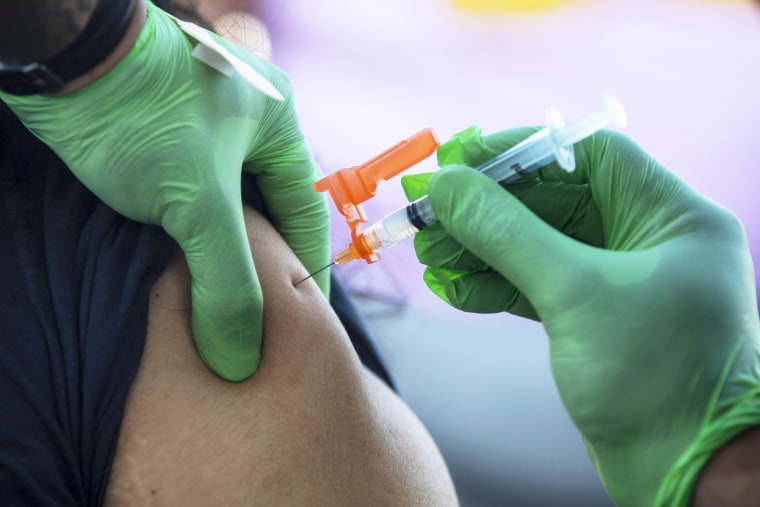A panel of independent advisers to the Centers for Disease Control and Prevention will meet Thursday to discuss whether some patients may need an additional dose of a Covid-19 vaccine.
Concerns are growing that patients with weakened immune systems — including those with autoimmune diseases, HIV patients, cancer patients and organ transplant recipients — may remain vulnerable to Covid-19 even after full vaccination.
Full coverage of the Covid-19 pandemic
Such patients may need second or third doses of a vaccine, depending on which vaccine they received. (The mRNA vaccines from Moderna and Pfizer-BioNTech require two doses, while the Johnson & Johnson vaccine requires just one.)
Israel, for example, has begun offering third doses of the Pfizer vaccine to people with weakened immune systems.
While the vaccines do still appear to cut the risk of hospitalization and death in immune-compromised people, "clearly there's a gap between those patients and those with normal immune systems," said an occupational medicine expert, Dr. Melanie Swift, co-chair of the Mayo Clinic's Covid-19 Vaccine Allocation and Distribution Workgroup.
Dr. Céline Gounder, an infectious disease specialist and epidemiologist at New York University at Bellevue Hospital, said such an update in the vaccine recommendations would "not mean the vaccines don't work."
"It means that we're still figuring out the best dosing regimen," Gounder said.
As the highly contagious delta variant spreads across the country, "that makes it all the more important that we have a very strong immune response" from the vaccines, Gounder said. The CDC reported Tuesday that the variant accounted for 83 percent of new cases in the U.S.
It is not unusual for vaccines to require multiple doses. The human papilloma virus vaccine is given in two doses, and a third is given to people with weakened immune systems. Two or three doses of the vaccine to prevent meningitis B are also needed, depending on the vaccine type. And the hepatitis B vaccine is given in up to four shots.
The independent panel of experts, called the Advisory Committee on Immunization Practices, is not expected to suggest changes in vaccine guidance at Thursday's meeting. The panel also discussed additional doses last month, concluding that there was not yet enough evidence to suggest that they were needed for the general population.
But a boost in immunity may be necessary in some groups. A study of cancer patients published in June found that even though such patients responded well to vaccines, it remained unclear how long their protection might last.
Other research from May found varying immune responses among certain cancer patients, "especially patients with blood cancers, what we call hematologic malignancies, who also require highly immunosuppressive drugs," Gounder said.
Organ transplant recipients, too, may need additional doses. They must take medications to suppress their immune systems so their bodies do not reject new organs. Those drugs may also dampen the body's response to vaccines.
A small study of 30 organ transplant recipients published in June suggested the need for a third dose. Even though all participants had been fully vaccinated with the Moderna or Pfizer-BioNTech vaccines, the majority ended up with no antibodies to the virus. Others had low levels of antibody response.
A third dose, researchers said, boosted the antibody response somewhat, but more studies are needed to determine which patients might benefit most.
Download the NBC News app for full coverage of the Covid-19 pandemic
Whether an additional dose would ultimately be needed can be analyzed in two ways. Are fully immunized immunocompromised patients experiencing breakthrough infections that are making them sick? And do blood samples from those patients indicate lower levels of immunity than in patients with normal immune systems?
Looking at the immune response goes beyond measuring antibody levels, Swift said.
"Some of these people will never develop a measurable neutralizing antibody, but does that mean they're not protected?" she said. Antibodies are not the only measure of the immune system's power and strength. Other cells, such as T cells and memory B cells, also play roles, but they are not easily measured in lab tests.
All three manufacturers with authorized Covid-19 vaccines in the U.S. have been investigating the safety and effectiveness of additional doses.
The National Institute of Allergy and Infectious Diseases, too, has launched a clinical trial to determine whether a third shot of the Moderna vaccine could be given after a person has already been fully immunized with the Pfizer or Johnson & Johnson vaccines.
Results from those trials are expected sometime this summer.
Follow NBC HEALTH on Twitter & Facebook.


